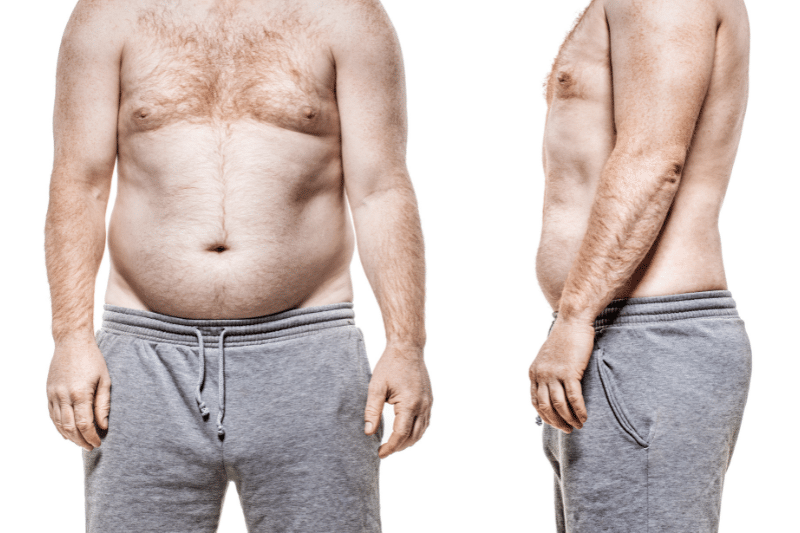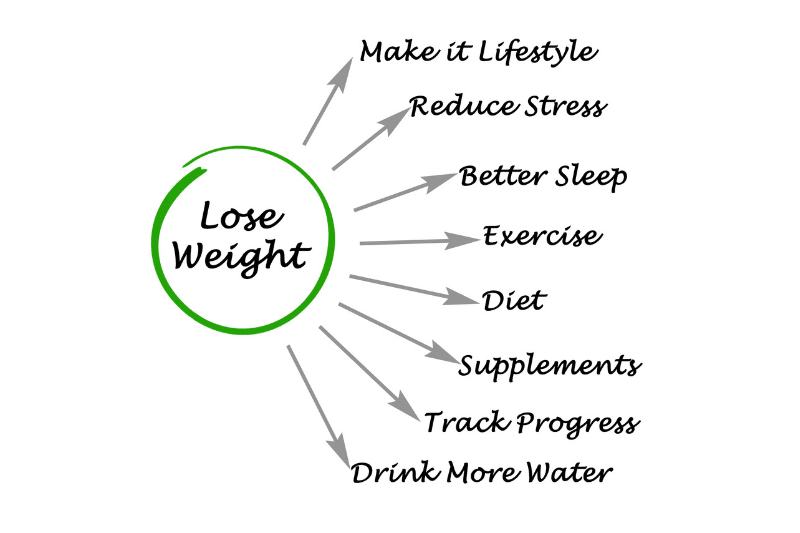This guide will focus on weight loss men’s health. Indeed weight loss is tough for men but with the right strategies you can achieve long-term success. Besides this, it will also cover the top 5 tips, and proven strategies to help men lose weight and live healthier. These tips are based on current data, expert opinions, and research findings so the advice is accurate and practical.
Weight Loss Men’s Health Overview
Understand Body Fat Percentage
Before we get into weight loss strategies it’s important to know how a man’s body is different from a woman’s when it comes to weight loss. Men have more muscle mass and less body fat than women.
This biological advantage means men can lose weight faster when they exercise regularly and eat healthily. But it’s also important to recognize that individual metabolic rates, lifestyle, other health conditions, and genetic predispositions play a big role in weight management.
According to the World Health Organization (WHO), 39% of adults worldwide were overweight in 2024 and men make up a big chunk of that number. In the US, the Centers for Disease Control and Prevention (CDC) says over 40% of men 20 and older are obese. These numbers prove we need to have weight loss strategies that are designed for men.
Setting Realistic Goals
When you start a weight loss journey, setting realistic goals is key. Unrealistic expectations will lead to frustration and burnout and ultimately set you back. Start by weighing yourself, your body fat percentage, and your overall health. A healthcare professional can give valuable insights and help you set achievable goals.
Research from the Journal of the American Medical Association (JAMA) says men who set specific, measurable, and achievable goals do better at losing weight. For example, losing 1-2 pounds a week is considered a healthy and sustainable rate of weight loss.

Weight Loss Men’s Health – Challenges
How to Lose Weight After Weight Gain?
Losing weight varies from person to person but a combination of a balanced diet, regular exercise, and lifestyle changes has been proven to be the most effective.
According to research suggests the National Institutes of Health (NIH) men who follow a comprehensive weight loss plan that includes calorie control, exercise, and behavior therapy will lose and maintain weight.
How Fast Can a Man Lose Weight?
While losing weight fast is tempting, be cautious. Crash diets or extreme exercise will lead to muscle loss, nutritional deficiencies, and other health risks. A safer and better way is to reduce calorie intake and increase physical activity.
High-intensity interval training (HIIT) with a high protein, saturated fat, and low carb diet will speed up weight loss but balance is key and don’t go extreme.
What is the 30-30-30 Rule for Weight Loss?
The 30-30-30 rule is a simple rule for weight loss for men. 30 minutes of exercise, 30 grams of protein per meal, and 300 calories deficit per day. This will get you moving, support muscle growth with enough protein, and create a calorie deficit for weight loss.
Why Do Men Lose Weight Differently Than Women?
Men lose weight differently than women. Due to hormone levels, body composition, and metabolic rates. Men have more testosterone which promotes muscle growth and fat loss. Men’s bodies store a higher risk of fat in the abdominal area as visceral fat which is easier to lose than the hip and thigh fat women store. Knowing this can help men tailor their weight loss strategies better.
What are the Common Challenges Men Face?
Men face many challenges when trying to lose weight, busy schedules, stress, and social pressures. According to the American Psychological Association (APA), 33% of men said work-related stress affected their ability to maintain a healthy weight.
And societal expectations of body size can sometimes make men not want to seek help or talk about their weight loss struggles and feel isolated.

Weight Loss Men’s Health – Nutrition Value
Healthy Ways to Lose Weight
Nutrition is key to achieving weight loss goals and making the right choices can make all the difference. A diet full of whole foods – vegetables, fruits, lean proteins, and whole grains – provides nutrients and keeps you full and satisfied. Reducing highly processed foods, sugary drinks and unhealthy fats is just as important. Additionally, making lifestyle changes including cutting down on white bread and drinking plenty of plain water.
According to the U.S. Department of Agriculture (USDA), men should aim for 2,500 or fewer calories in a day depending on their age, activity, fitness level, and weight loss goals. Adjust that to create a calorie deficit and you’ll lose weight.
What Should Men Eat to Lose Weight?
Men should eat nutrient-dense foods that support muscle growth and fat loss. Here are the best foods for weight loss:
Lean Proteins
Chicken breast, turkey, fish, and plant-based proteins like lentils and beans.
Healthy Fats
Avocados, nuts, seeds, and olive oil.
Whole Grains
Brown rice, quinoa, oats, and whole wheat bread.
Fruits and Vegetables
Leafy greens, berries, apples, carrots and broccoli.
These foods provide the nutrients and keep you full so you don’t overeat.

What are the Best High-Protein Foods for Men’s Weight Loss?
High-protein foods are essential for preserving muscle mass during weight loss. They also help increase satiety, making it easier to stick to a reduced-calorie diet. Some of the best high-protein foods for men include:
-
Eggs – Rich in protein and essential amino acids.
-
Greek Yogurt – Low in fat and high in protein.
-
Lean Meats: Chicken, turkey, and lean cuts of beef.
-
Fish – Salmon, tuna, and other fatty fish are high in protein and omega-3 fatty acids.
-
Legumes – Beans, lentils, and chickpeas are excellent plant-based protein sources.
Incorporating these foods into your healthy diet can help you achieve your weight loss goals more effectively.
How Important is Calorie Counting for Men’s Weight Loss?
Calorie counting is a useful tool for weight loss, as it helps you monitor your food intake and ensure that you’re maintaining a calorie deficit. While it can be time-consuming, tracking your calories can provide valuable insights into your eating habits and help you make more informed decisions.
According to a study published in the American Journal of Clinical Nutrition, individuals who consistently track their calorie intake are more likely to achieve significant weight loss compared to those who don’t. However, it’s important to balance calorie counting with mindful eating practices to avoid becoming overly restrictive.

Weight Loss Men’s Health – Exercise and Physical Activity
Effective Exercise for Sustainable Weight Loss
Exercise is a fundamental component, and incorporating both cardiovascular and strength training exercises can maximize results. Regular physical activity not only helps burn calories but also improves overall health boosts mood and increases energy levels.
According to the American Heart Association (AHA), men should aim for at least 150 minutes of moderate-intensity aerobic activity or 75 minutes of vigorous-intensity aerobic activity per week, combined with muscle-strengthening activities on two or more days a week.
How to Fast to Lose Weight?
Intermittent fasting (IF) is a popular weight loss strategy that involves alternating periods of eating and fasting. Research published in the New England Journal of Medicine indicates that intermittent fasting can help men lose weight by improving metabolism, reducing appetite, and promoting fat loss.
Among the common approaches are the 16:8 method, where you fast for 16 hours and eat within an 8-hour window, and the 5:2 method, where you eat normally for five days and restrict calories on the other two days.
What are the Best Exercises for Men to Lose Belly Fat?
Belly fat is often stubborn, but certain exercises can help target this area. Some of the most effective exercises for losing belly fat include:
Cardio Exercises
Running, cycling and swimming help burn calories and reduce overall body fat.
HIIT Workouts
Additionally, interval training, which involves short bursts of intense exercise followed by rest periods, can effectively burn fat and boost metabolism.
Strength Training
Lifting weights, especially exercises like deadlifts, squats, and bench presses, builds muscle mass and increases calorie burn.
Core Exercises
Planks, crunches, and leg raises target the abdominal muscles and help tone the midsection.
Moreover, adding these exercises to your routine can help you achieve a leaner and more defined physique.
How Often Should Men Work Out to Lose Weight Effectively?
Consistency is key when it comes to exercise and weight loss. Men should aim to work out at least 3-5 times per week, combining both cardio and strength training exercises. This approach ensures that you’re burning calories while building and preserving muscle mass.
A study published in the International Journal of Applied Physiology found that men who engaged in regular physical activity, including both aerobic exercise and resistance training, experienced greater fat loss and improved overall health markers compared to those who focused on one type of exercise alone.
What’s the Role of Strength Training in Men’s Weight Loss?
Strength training is key to men’s weight loss by building muscle and boosting metabolism. Muscle tissue burns more calories at rest than fat tissue so the more muscle you have the more calories you’ll burn all day.
Strength training also prevents muscle loss during weight loss so the excess weight that you lose is fat not muscle. Doing compound exercises like squats, deadlifts, and bench presses will help you build muscle faster and get better weight loss results.

Weight Loss Men’s Health – Setting Goals and Tracking Progress
Staying motivated during your weight loss journey is important and tracking your progress will help you stay on track. Using tools like fitness apps, food journals, and wearable devices will give you valuable insights into your progress and keep you accountable.
According to the Obesity Journal, men who tracked their food intake, exercise routine, and weight loss progress regularly were more likely to achieve their weight loss goals. Setting short-term and long-term goals will also help to stay motivated as reaching milestones will give you a sense of accomplishment.
Can You Lose 30 lbs in 3 Months?
Losing 30 extra pounds in 3 months is a big goal but it’s doable with dedication and the right plan. To lose this much weight you would need to create a calorie deficit of 1,000-1,500 calories a day through diet and exercise.
But be careful with this goal. Rapid weight loss can lead to muscle loss, nutritional deficiencies, heart disease, and other health risks. Make sure you focus on a balanced diet and regular physical activity so the extra weight that you lose is from fat not muscle.
How to Lose 20 Pounds in a Month?
Losing 20 pounds in a month is a tough goal that requires a strict calorie deficit and intense exercise. Intermittent fasting with high protein, low carb diet can help speed up weight loss. Adding both cardio and strength training can help maximize fat loss while preserving muscle.
But remember losing weight this fast is not sustainable in the long term weight maintenance and run. Rapid weight loss has negative effects so consult a registered dietitian or doctor before starting this kind of plan.
How to Lose 20 Pounds in a Month?
To lose 20 pounds in a month men need to create a big calorie deficit of around 1000 calories a day. This can be achieved by reducing calorie intake and increasing physical activity. A high protein, low carb diet with regular exercise will help with fat loss.
Also, stay hydrated, get enough sleep, and manage stress as these will impact weight loss. This is tough but possible with dedication and the right plan.
How to Set Realistic Weight Loss Goals?
Setting realistic weight loss goals is key to long-term success. Men should start by measuring their current weight, body composition, and overall, health status. Consulting with a health professional will give you valuable insights and help you set achievable targets.
Losing 1-2 pounds a week is considered healthy and sustainable. Setting short-term and long-term goals will help keep you motivated and have a clear roadmap for your weight loss journey.

What are the Best Tools for Monitoring Progress?
There are many tools to help men track their progress. Here are a few:
Fitness Apps
MyFitnessPal, Lose It!, Fitbit.
Wearable Devices
Fitbit, Apple Watch, Garmin.
Food Journals
Keeping a food diary.
Using these tools will help you stay on track to your goals.
How to Stay Motivated?
Staying motivated is tough during a weight loss journey but here are a few tips:
Set Short-Term Goals
Achieve small wins and you’ll always feel satisfied, accomplished, and motivated.
Find a Workout Buddy
Having a workout partner will hold you accountable and make it more fun.
Reward Yourself
Treat yourself to non-food rewards like new workout gear or a massage when you hit your goals.
Stay Positive
Focus on the progress, not the setbacks. A positive mindset will help you stay motivated and overcome obstacles.
Remember that weight loss is a journey, and it’s important to stay patient and persistent.

Weight Loss Men’s Health – Lifestyle Changes and Long-term Success
Long-term weight loss is more than just diet and exercise; it’s lifestyle changes. Making healthy habits like getting enough sleep, managing stress, and being active can help you maintain your weight loss and overall health.
According to the National Weight Control Registry (NWCR) people who successfully maintain their weight loss are active regularly, eat a low-calorie diet, and weigh themselves regularly. These habits will help you stay on a steady weight loss track and prevent weight regain.
How Does Sleep Affect Men’s Weight Loss?
Sleep is key to weight and excess fat loss as it affects the hormones that regulate hunger and metabolism. According to a study in the Journal of Clinical Endocrinology & Metabolism men who don’t get enough sleep are more likely to experience increased hunger and cravings and weight gain.
Aim for 7-9 hours of sleep per night to support your weight loss. Establish a sleep routine, avoid caffeine and electronics before bed, and create a sleep-friendly environment to improve your sleep.
What are the Best Habits for Long-term Weight Loss?
Here are some habits that can help:
-
Exercise, both cardio and strength training, will help you maintain weight loss and overall health.
-
Pay attention to hunger and fullness cues, eat slowly, and don’t eat in front of screens.
-
Plan your meals and snacks so you can stick to your diet and avoid bad choices.
-
Practice stress-reducing activities like yoga, meditation, or deep breathing exercises to prevent emotional eating and support weight loss.
Implement these habits and you will maintain your weight loss and overall health.
How Stress Management Can Help with Weight Loss?
Stress management is part of healthy weight loss, as chronic stress can lead to weight gain and hinder your progress. When you’re stressed your body releases cortisol, a hormone that increases appetite and fat storage, especially around the midsection.
Practicing stress-reducing activities like yoga, meditation, or deep breathing exercises can lower cortisol levels and prevent stress-related weight gain. Managing stress can also improve your overall well-being and make it easier to stick even to the short term weight loss plan.











